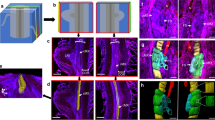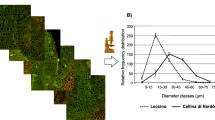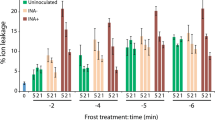Abstract
IT is well established that the germ tubes of urediospores of rust fungi penetrate host tissue exclusively through stomata. The factors affecting their growth towards stomata are not known. Our observation of a directional growth of urediospore germ tubes of Puccinia antirrhini and other species of rust fungi on surface of leaves of Antirrhinum majus may have some bearing on this problem.
This is a preview of subscription content, access via your institution
Access options
Subscribe to this journal
Receive 51 print issues and online access
$199.00 per year
only $3.90 per issue
Buy this article
- Purchase on Springer Link
- Instant access to full article PDF
Prices may be subject to local taxes which are calculated during checkout
Similar content being viewed by others
References
Johnson, T., Phytopathology, 24, 80 (1934).
Sampson, J., Nature, 191, 932 (1961).
Maheshwari, R., thesis, Univ. Wisconsin (1966).
Dickinson, S., Trans. Brit. Mycol. Soc., 47, 300 (1964).
Author information
Authors and Affiliations
Rights and permissions
About this article
Cite this article
MAHESHWARI, R., HILDEBRANDT, A. Directional Growth of the Urediospore Germ Tubes and Stomatal Penetration. Nature 214, 1145–1146 (1967). https://doi.org/10.1038/2141145a0
Issue Date:
DOI: https://doi.org/10.1038/2141145a0
Comments
By submitting a comment you agree to abide by our Terms and Community Guidelines. If you find something abusive or that does not comply with our terms or guidelines please flag it as inappropriate.



